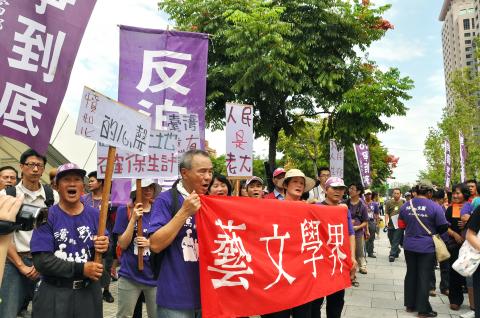Dozens of supporters of San-ying Aboriginal Community (三鶯部落) — including social activists, students, musicians, writers, artists, film directors and academics — yesterday visited the campaign headquarters of both the Democratic Progressive Party (DPP) and Chinese Nationalist Party (KMT) Sinbei mayoral candidates Tsai Ing-wen (蔡英文) and Eric Chu (朱立倫) to ask them to clarify their stand on the relocation of their community.
The Sanying Aboriginal Community is a small community where the vast majority of residents are Amis Aborigines from Hualien and Taitung counties who moved to Taipei to work as construction workers and miners about 30 years ago.
Since they could not afford housing in the city, they found a plot of unused land next to -Sanying Bridge (三鶯大橋) on the Dahan River (大漢溪) and built their own houses using whatever material they could find.
Over the past decade, the community has been razed by the county government several times as the houses were illegally constructed in a restricted zone. However, residents rebuilt their homes each time the village was flattened.
Although the county government built a block of rental apartments not far from the original Sanying Community for residents to move into, many continue to prefer the riverside village saying they could not afford the rent and utility bills.
As the issue remains unresolved, residents are keen to know how the future mayor plans to handle the issue.
“What we’re asking for is simple: Either allow the residents to stay where they are or find another plot of land for them to relocate,” said Chiang Yi-hau (江一豪), a core member of the Sanying Community Self-Help Association.
“We can discuss more details such as how to rent the land collectively, but at the very least we would like to know what they have in mind,” he said.
Film director Hou Hsiao-hsien (侯孝賢) said that “Aborigines are the real masters of this island” and deserve more respect from the government.
Writer Chu Tien-hsin (朱天心) pledged she would stand shoulder to shoulder with Sanying Community.
Eric Chu’s campaign spokesman Chang Chi-kai (張啟楷) received the activists and promised that the- candidate would visit the community in person within a week — but declined to say whether it would be an open visit.
More than 200 Sanying residents and activists visited the two campaign headquarters on Oct. 9, and both candidates promised to visit the community within two weeks, but failed to do so.
A staffer at Tsai’s campaign office, Tseng Tsung-kai (曾琮愷), met with the activists and promised that the office “will send someone to the community within a week.”
Tsai commented to the media in a separate setting later that “making promises [about Sanying Community] during the campaign is unrealistic.”
“To solve the Sanying issue, I must have a better understanding of it and take into consideration Aboriginal culture and the residents’ wishes,” she said.
The Sanying Aboriginal Community is a small community where the vast majority of residents are Amis Aborigines from Hualien and Taitung counties who moved to Taipei to work as construction workers and miners about 30 years ago.
Since they could not afford housing in the city, they found a plot of unused land next to -Sanying Bridge (三鶯大橋) on the Dahan River (大漢溪) and built their own houses using whatever material they could find.
Over the past decade, the community has been razed by the county government several times as the houses were illegally constructed in a restricted zone. However, residents rebuilt their homes each time the village was flattened.
Although the county government built a block of rental apartments not far from the original Sanying Community for residents to move into, many continue to prefer the riverside village saying they could not afford the rent and utility bills.
As the issue remains unresolved, residents are keen to know how the future mayor plans to handle the issue.
“What we’re asking for is simple: Either allow the residents to stay where they are or find another plot of land for them to relocate,” said Chiang Yi-hau (江一豪), a core member of the Sanying Community Self-Help Association.
“We can discuss more details such as how to rent the land collectively, but at the very least we would like to know what they have in mind,” he said.
Film director Hou Hsiao-hsien (侯孝賢) said that “Aborigines are the real masters of this island” and deserve more respect from the government.
Writer Chu Tien-hsin (朱天心) pledged she would stand shoulder to shoulder with Sanying Community.
Eric Chu’s campaign spokesman Chang Chi-kai (張啟楷) received the activists and promised that the- candidate would visit the community in person within a week — but declined to say whether it would be an open visit.
More than 200 Sanying residents and activists visited the two campaign headquarters on Oct. 9, and both candidates promised to visit the community within two weeks, but failed to do so.
A staffer at Tsai’s campaign office, Tseng Tsung-kai (曾琮愷), met with the activists and promised that the office “will send someone to the community within a week.”
Tsai commented to the media in a separate setting later that “making promises [about Sanying Community] during the campaign is unrealistic.”
“To solve the Sanying issue, I must have a better understanding of it and take into consideration Aboriginal culture and the residents’ wishes,” she said.
全文轉載自 台北時報 Taipei Times


沒有留言:
張貼留言